

Online Courses. Skip to main content SitemapPrivacy PolicyHarvard Graduate School of EducationHarvard University Copyright 2016 President and Fellows of Harvard College | Harvard Graduate School of Education Subscribe to Our Mailing List By submitting this form, you are granting: Project Zero, 13 Appian Way, Cambridge, Massachusetts, 02138, United States, permission to email you.
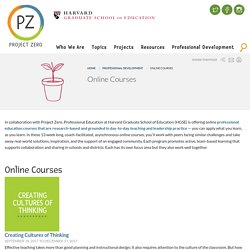
You may unsubscribe via the link found at the bottom of every email. Contact Us. What Is Genius Hour? - What Is Genius Hour?
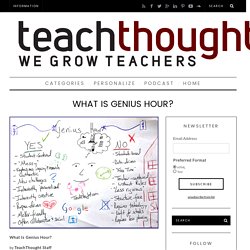
By TeachThought Staff Genius hour is an approach to learning where students are guided by their own interests, background knowledge, and curiosity to learn. From the outside looking in, it is less organized, less formal, and less standardized than traditional learning. Genius hour is truly “open-ended” learning characterized by student self-direction, passion-based learning, inquiry, and autonomy. In public education, genius hour can be thought of as a response to rigid, test-driven, and “achievement-focused” climate that testing-based model of school improvement has encouraged in schools over the two or three decades.
It has several unique characteristics that separate it from other approaches to education. Characteristics Of Genius Hour The image above provides 10 characteristics and 10 non-characteristics of genius hour. 5 Characteristics Of Project-Based Learning That Works - Schedule a TeachThought Professional Development PBL Workshop For Your School > 5 Characteristics Of Project-Based Learning That Works by Drew Perkins, Director of TeachThought Professional Development Interested in learning more about how to leverage great thinking and learning using authentic project-based learning?
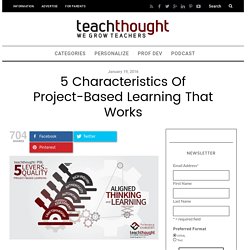
Check our PBL Workshop Services. As I’ve written before (What PBL Can Do For Your School…And What It Won’t) project-based learning can be an amazing tool for student, teacher, and school growth but only if you’re getting great thinking and learning as a result. Quality PBL takes advantage of built-in and designed levers of quality that helps the teacher as facilitator align the thinking and learning we’re after in our students. Kindergarten Store Project - Randi Lembke.
Three Billy Goats Gruff 7.17.15. Kindergarten Science Curriculum - Science4Us. Science is messy.
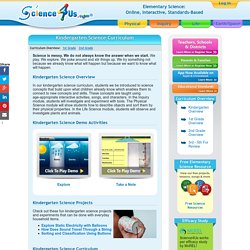
We do not always know the answer when we start. We play. We explore. We poke around and stir things up. We try something not because we already know what will happen but because we want to know what will happen. Kindergarten Science Overview In our kindergarten science curriculum, students we be introduced to science concepts that build upon what children already know which enables them to connect to new concepts and skills. Kindergarten Science Demo Activities Kindergarten Science Projects Check out these fun kindergarten science projects and experiments that can be done with everyday household items. Kindergarten Science Curriculum View Kindergarten Lesson Plans What science teachers are saying… I have been teaching kindergarten for six years.
Education Theory/Constructivism and Social Constructivism in the Classroom - UCD - CTAG. General Overview In the constructivist classroom, the focus tends to shift from the teacher to the students.
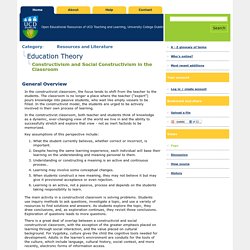
The classroom is no longer a place where the teacher ("expert") pours knowledge into passive students, who wait like empty vessels to be filled. In the constructivist model, the students are urged to be actively involved in their own process of learning. Field Trip Earth. Global SchoolNet: Home. Canada Education—Teaching Tip of the Month. March 2013 • Sue Jackson Once you have a classroom environment which promotes curiosity, fascination, and mindfulness, students begin to raise questions and seek answers through the inquiry process.
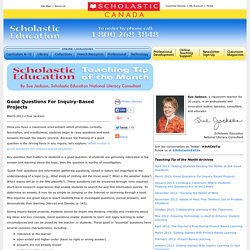
Because the framing of a good question is the driving force in any inquiry, let's explore: What makes a good question for inquiry-based projects? Any question that matters to students is a good question. If students are genuinely interested in the answer and learning about the topic, then the question is worthy of investigation. 'Quick Find' questions are information gathering questions, closed in nature but important to the understanding of a topic (e.g., What kinds of clothing did the Incas wear? Inquiry-Based Lesson Plans.
Inquiry Learning Student understanding is the central focus of inquiry learning.
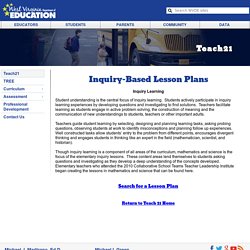
Students actively participate in inquiry learning experiences by developing questions and investigating to find solutions. Teachers facilitate learning as students engage in active problem solving, the construction of meaning and the communication of new understandings to students, teachers or other important adults. Teachers guide student learning by selecting, designing and planning learning tasks, asking probing questions, observing students at work to identify misconceptions and planning follow up experiences. Well constructed tasks allow students’ entry to the problem from different points, encourages divergent thinking and engages students in thinking like an expert in the field (mathematician, scientist, and historian). Though inquiry learning is a component of all areas of the curriculum, mathematics and science is the focus of the elementary inquiry lessons. Search for a Lesson Plan. Introduction.
Institute for Inquiry: Examining the Art of Science Education. The Institute for Inquiry® (IFI) is a professional development program that addresses the theory and practice of inquiry-based science education.
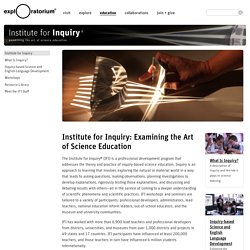
Inquiry is an approach to learning that involves exploring the natural or material world in a way that leads to asking questions, making observations, planning investigations to develop explanations, rigorously testing those explanations, and discussing and debating results with others—all in the service of coming to a deeper understanding of scientific phenomena and scientific practices.